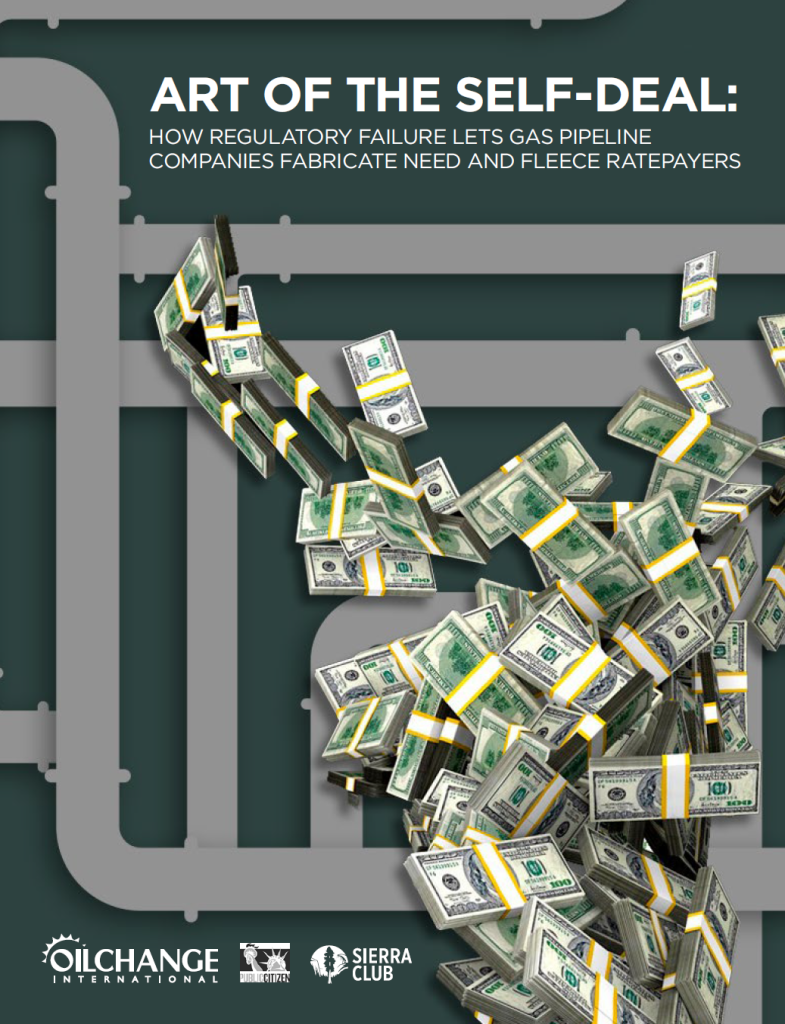Oil Change International
In collaboration with Public Citizen and the Sierra Club
September 2017
A new report released by Oil Change International, Public Citizen, and the Sierra Club examines how a new wave of gas pipeline construction threatens to shunt serious risks and costs on to utility ratepayers.
Utilities and gas companies are increasingly engaged in self-dealing practices to support a dangerous gas pipeline buildout in the Appalachian Basin. Lax oversight from regulators – particularly the Federal Energy Regulatory Commission (FERC) – is enabling companies to manufacture ‘need’ for projects while shifting financial risks from shareholders to ratepayers.
Absent effective oversight, ratepayers could end up shouldering long-term costs for pipeline capacity they don’t need, while losing out on opportunities to take advantage of increasingly cheaper, cleaner choices.
Case studies of four pipelines illustrate this dynamic: the Atlantic Coast, Mountain Valley, PennEast, and NEXUS projects.
Key risk factors identified include:
- Corporate self-dealing is increasing the likelihood that ratepayers, not shareholders, bear the financial risks of investing in gas pipelines;
- High rates of return set by FERC that beat returns available in other activities are luring new players such as utilities into the gas pipeline business; and
- Today’s dynamic energy landscape is creating increasing uncertainty over the future demand for gas. This requires greater scrutiny than ever from regulators if the risks and costs of overbuild are to be avoided.
Key recommendations from the report include:
- The Federal Energy Regulatory Commission should immediately initiate a review of long-term market demand for gas and of the Commission’s granting of excessive rates of return on equity for pipelines.
- State Public Service Commissions should assert their authority to review contracts between the utilities they regulate and the proposed gas pipelines in which affiliates of these same companies are investing; and
- FERC should halt all permitting of interstate gas pipelines in the meantime, while these processes are pursued.
Click here to download the report.
Previous research has exposed the climate risks the gas buildout poses. For more details on why new gas pipelines are incompatible with a stable climate, see our report: “A Bridge Too Far: How Appalachian Basin Gas Pipeline Expansion Will Undermine U.S. Climate Goals.”


Take a lesson from the demand not needed for new nuclear reactors. e.g. in Georgia. If co’s want to build new pipelines, the risks shd be on owners not ratepayers. Also, how much of this gas stays vin VA?
Question: When will it be time to nationalize the whole oil industry?
Answer: NOW!!!
The rules actually say that if a contract for the gas is cancelled the pipeline owners can do with the gas … whatever. So all they need is those affiliated contracts and they are home free